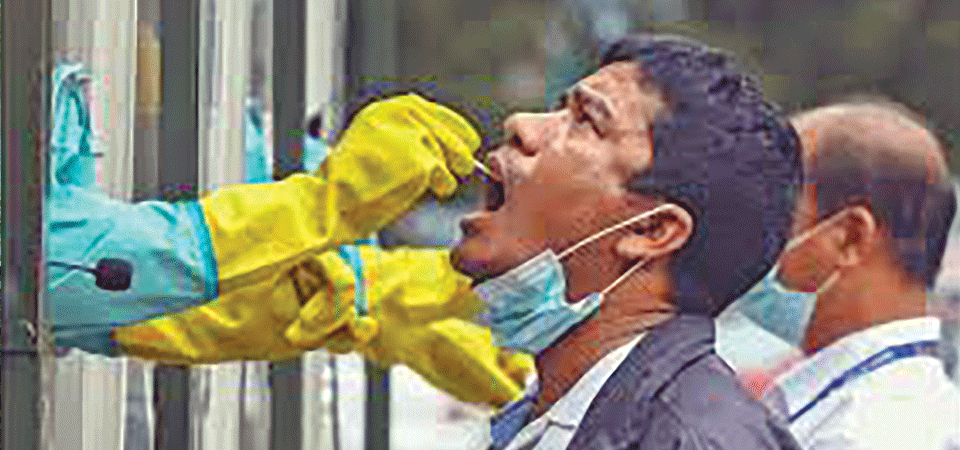Combatting Pandemic's Second Wave

Jenish Tamang
The year 2020 was remembered for and identified with the COVID-19 pandemic, lockdowns, quarantines and isolations. However, the year 2020 was mainly remembered for the COVID-19 pandemic that caused many problems, namely loss of human life, social and economic disruption, increase in poverty, increase in the number of layoff and unemployment.
COVID-19 also became fuel to racism, mental health problems, domestic violence as there were many examples and cases related to these factors from all over the world. For an instance, let's take the example of the former president of America, Donald Trump calling COVID -19 a Chinese virus and later denying it as his mistake when he was interviewed later.
Mental Distress
During the pandemic, there have been numerous instances where people belonging to racial, religious, or ethnic minorities were subjected to physical attacks, hate speech, and conspiracy theories accusing them. Many people have been reported suffering from mental distresses due to joblessness, loneliness and other economic turndowns. Various studies have reported an increase in depression and anxiety among people. Suicide rates have been on the rise since the pandemic began and researches have shown that people with job loss or low incomes report higher rates of mental illness than those without job or income loss. Lockdown and quarantines had confined people to stay in their home, increasing the risk of domestic violence. Nepal also faced similar problems that I have already mentioned above. Besides, Nepal also faced disputes among people having the idea of celebrating festivals that violate the WHO guidelines of COVID-19 of public gatherings, political support programs of different political parties.
Although COVID-19 brought many problems in negative aspects of our lives, this pandemic also came with many opportunities, new alternatives, and learnings. The most important learning from COVID-19 was the importance and need for humanity, empathy and solidarity.
The COVID-19 pandemic is not a war zone of combat and competing interests, but a 'test of our humanity, as the German president Frank-Walter Steinmeier said in his televised speech on 11th April 2020. This pandemic has allowed us to promote and imply humanity and empathy in different ways.
Although many questions about practising humanity and empathy raised when they were in lockdown and were not able to physically be present for one another, however, technology has created a new alternative to practice and promote humanity. For an instance, we can use social media platforms to aware people of COVID-19.
Promoting Humanity
We can also promote humanity by simply being responsible and following all the guidelines and principles of COVID-19. This action can be small but can help to become ethical and restore humanity. There is humanity present in every simple action we do for instance if someone who has COVID gets quarantined by following all the guidelines, doctors, nurses and all the frontliners if they help the patients indiscriminately and if the reporters, writers give the right information about COVID-19 and also the politicians and influencers guide people or aware people about COVID-19
Everyone needs to ponder upon their ethics and moral values that contribute to upholding humanity, inform us about unsolved dilemmas and ways to solve the dilemmas. It is necessary to identify ethical principle and rules that inform what claims or actions are justified and consequently needed to act upon
Article of Els Maeckelberghe and Peter Schroder-Back published in the European Journal of public health proposes the use of seven ethical principles that should be addressed when we need to make transparent decisions.

Higher Severity
As Nepal is facing the second wave of COVID-19 and the severity is much higher than the first wave, it is important to understand that virus affects everybody and everybody's lives, but not in equal ways. Therefore it is important to understand the above 7 principles and implement them. Therefore there must be long term and indiscriminate help and services provided to people.
It is also necessary for everyone to ponder upon the ethical principles and moral values that can contribute to upholding humanity and solving the dilemmas created by COVID- 19. The dilemmas and moral distress create a situation of evaluating and testing out humanity and we must all come together to fight against COVID-19.
(Tamang is a college student)
Recent News

Do not make expressions casting dout on election: EC
14 Apr, 2022
CM Bhatta says may New Year 2079 BS inspire positive thinking
14 Apr, 2022
Three new cases, 44 recoveries in 24 hours
14 Apr, 2022
689 climbers of 84 teams so far acquire permits for climbing various peaks this spring season
14 Apr, 2022
How the rising cost of living crisis is impacting Nepal
14 Apr, 2022
US military confirms an interstellar meteor collided with Earth
14 Apr, 2022
Valneva Covid vaccine approved for use in UK
14 Apr, 2022
Chair Prachanda highlights need of unity among Maoist, Communist forces
14 Apr, 2022
Ranbir Kapoor and Alia Bhatt: Bollywood toasts star couple on wedding
14 Apr, 2022
President Bhandari confers decorations (Photo Feature)
14 Apr, 2022










